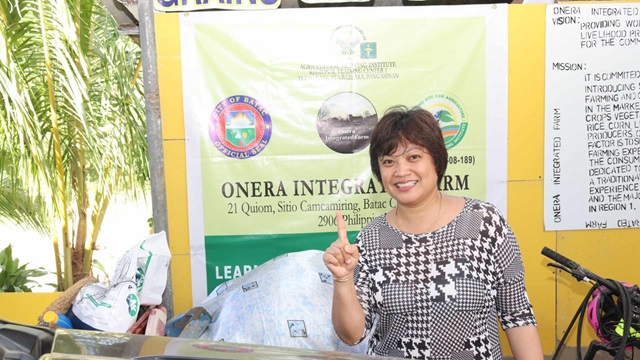
Jenipher Onera, a recent farm school owner, charts a remarkable course from overseas Filipino worker (OFW) to a successful rice educator; thanks to the emblematic impact of her thirst for knowledge nourished by Rice Competitiveness Enhancement Fund Rice Extension Services Program (RCEF RESP).
After 18 years as an overseas Filipino worker (OFW) in the United Arab Emirates (UAE), she returned to her hometown in Batac, Ilocos Norte when her mother fell ill.
“We were living in Dubai with our two children. In 2018, we decided to return to the Philippines for good, and invested our savings into a rice and grains trading business. Unfortunately, the COVID-19 pandemic forced us to close down due to lockdown restriction,” Jenipher recalled.
Undeterred by the setback, Jenipher secured a loan to revive their family farm, which had been idle for years. With limited experience in agriculture, they embarked on a journey of learning and adaptation.
Although Jenipher was not sure then whether she could earn a decent living from farming, she capitalized on buying and selling livestock and growing vegetables.
“We started from zero. We didn’t know how to farm. We just used available resources and the loaned money we got,” she said. They ventured into organic farming that produced safe and healthy food for her family and farmhands.
Until she joined the RESP’s training of trainers, in which she learned high-quality inbred rice cultivation, farm mechanization, and pest and nutrient management.
“Joining the training changed my perspective on farming. I was not then progressive as my exposure was on traditional farming. With modern rice production, I can earn more, harvest more. [I also did not see a brighter future in farming until I met fellow trainees who own farm schools]. I was motivated to build a learning site so fellow farmers can see and experience the advantages of using new farm technologies,” she explained.
After three years of hard work, their farm received a Learning Site for Agriculture certificate from the Agricultural Training Institute in August 2023. It has since become a hub for training programs and seminars with a focus on cattle breeding and rice production. By implementing the techniques learned through training such as utilizing recommended inbred rice varieties, the farm’s productivity has significantly increased.
“We planted NSIC Rc 160 and 222, which gave us a 4t/ha yield from the usual 1t/ha. With this improvement, I’m one proud farmer,” she said.
Jenipher expressed gratitude for the support provided by the RCEF Program.
“I did not only gain knowledge. My skills and attitude towards collective efforts were also enhanced. I’ve learned the importance of farmers’ organization, especially in accessing government interventions like RCEF. I’m inspired to share my learnings with the farmers. Learnings that will help assure that no one will get hungry in farming,” she said.
The RCEF RESP is a component of Republic Act 11203 or Rice Tariffication Law, which allocates P10 billion fund every year for rice farmers. Sponsored by Sen. Cynthia Villar, the program is a six-year government initiative to help farmers compete in the international rice market. The local government units and lawmakers assist its implementation.




